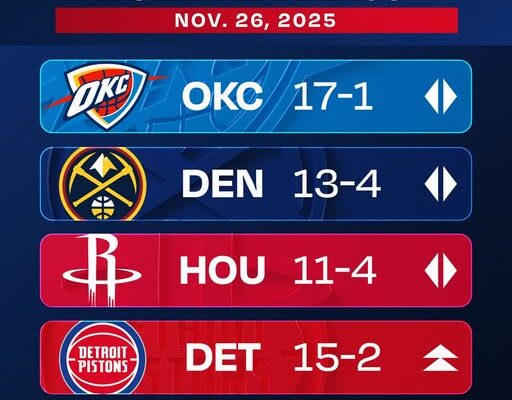The top three remains unchanged, but the Pistons are on the move after winning 13-straight games—a sentence that would’ve sounded like satire not too long ago. Yet here we are, living in a moment where Detroit basketball has transformed from a rebuilding punchline to one of the most compelling stories in the league. Their surge hasn’t just disrupted the middle of the standings; it’s shaken the entire ecosystem around it. The league’s balance of power was feeling fairly stable, at least on paper. The contenders were the contenders, the tankers were the tankers, and the rest fell somewhere in the muddled middle. But then Detroit ripped off nearly two dozen nights of fearless, disciplined, unusually mature basketball and forced everyone to re-evaluate what they thought they knew.
Momentum is a funny thing—unpredictable in origin, unstoppable once it takes hold. Detroit’s run didn’t come from a blockbuster trade, a sudden superstar emergence, or a dramatic firing. It came from the small, steady improvements that most teams never have the patience to nurture. That’s partly why this streak feels so jarring: the Pistons didn’t leap forward; they advanced one careful step at a time until suddenly those steps turned into a sprint.
Even more fascinating is that their rise hasn’t bumped the top three off their throne. That hierarchy remains exactly as it was: three powerhouses operating on a slightly elevated plane, clearly built for the long grind of the season and the pressure cooker of the playoffs. They’re deep, experienced, well-coached, and appropriately feared. Every time one of them loses, it feels like a rare breach in their armor. Every time they win, it feels like the natural order being restored. No matter who occupies those top three seats, their presence exerts a gravitational pull on the entire league.
But Detroit has become the meteor hurtling toward that orbit.
What makes the Pistons’ run so enthralling isn’t merely the length of the streak—though 13 straight is remarkable for any team—it’s the personality behind their transformation. The Pistons weren’t supposed to win this way. They weren’t constructed to overwhelm teams. They weren’t expected to display poise in tight fourth quarters. They weren’t projected to look this connected, this confident, this… good.
Their young core was labeled talented but unrefined, promising but inconsistent. A typical rebuilding script—lots of potential, lots of patience, lots of losing. Yet something clicked. It wasn’t one player suddenly carrying the franchise on his back. It was the collective sharpening itself. Everyone seems to understand their role now. Everyone seems to buy into the same mission. Everyone seems to trust the process, but more importantly, trust each other.
Basketball at its highest level is a symphony of timing, movement, and instinct. During this streak, Detroit has rarely broken rhythm. They’re making the extra pass, hitting open shots, rotating with purpose, contesting without fouling, and strangling opponents’ momentum before it can grow. Their defensive intensity fuels their offense, and their offensive patience fuels their defense. The game looks easier for them because everyone is playing within themselves—yet also pushing themselves beyond what they were a month ago.
There are turning points in every season that fans don’t recognize until hindsight sharpens the view. Maybe a team meeting. Maybe a tough road win. Maybe a specific lineup tweak that didn’t seem meaningful at the time but ended up unlocking an essential dynamic. For Detroit, the turning point feels less like a moment and more like a collective exhale. The fear of losing seems to have evaporated. They’re no longer bracing for mistakes; they’re pursuing possibilities. That shift alone changes everything.
Contrast that with the top three. These teams operate with the burden of expectation. They’re judged not on improvement but on dominance. An off night brings scrutiny. A winning streak brings relief more than celebration. That’s the paradox of being elite—your successes are normal; your failures are magnified. Detroit doesn’t carry that weight. They’re free in a way the top contenders can’t be. They can play hungry, fearless basketball because they aren’t expected to win every night. They can surprise teams, catch them flat-footed, and punch above their weight without any of the pressure that shadows the league’s giants.
Momentum like Detroit’s often says as much about the chemistry of a team as it does about talent. Chemistry is the quiet, invisible engine behind successful basketball. You can’t quantify it, but you know when it’s there. You can see it in the trust of a no-look pass, the willingness to set a hard screen that frees a teammate, the rotation that covers someone else’s mistake. During this streak, Detroit’s chemistry has been unmistakable. Even their bench looks synchronized—celebrating smart plays, lifting teammates after errors, maintaining energy that spills onto the court like electricity.
Opponents are starting to adjust. Early in the streak, teams underestimated Detroit, expecting the Pistons to eventually fold under pressure or revert to their early-season inconsistencies. But as the wins piled up, game plans started to change. Coaches scouted them more seriously. Opposing defenses keyed in on their first options. Opposing offenses tested their discipline. And still, Detroit endured. That’s the mark of a team finding its identity: the ability to withstand adjustments and still impose their style on the game.
Meanwhile, the top three look as formidable as ever. Their dominance isn’t diminished by Detroit’s rise; instead, the Pistons’ surge enhances the landscape around them. They provide contrast—an underdog forging its path upward, challenging the established order. At the same time, the elite trio offers a measuring stick for Detroit. The streak has been impressive, but every contender eventually meets the reality of facing greatness. Those matchups will be baptismal, revealing whether Detroit is merely hot or truly transformed.
Fans love narratives like this for a reason. Sports aren’t just about numbers or outcomes; they’re about possibility. They’re about watching something improbable unfold in real time. They’re about believing that the future can change faster than anyone expects. Detroit’s run injects unpredictability into a league that sometimes feels overly scripted. It proves that the middle of the standings isn’t always just filler—it’s fertile ground for surprise.
For young teams, confidence is both fragile and contagious. One good game can spark two. Two can spark five. Five can spark a month of winning basketball. And once that confidence settles in, it manifests through body language, through assertiveness, through clarity. That’s what the Pistons are displaying right now: the clarity that they belong on the court with anyone.
Still, the streak will end eventually. All streaks do. The real question is what happens next. Does Detroit fall back into old habits? Or does this run become a building block that sustains them long after the numbers reset to zero? Good teams don’t just win—they learn how to win. They learn how to respond when the shots stop falling, when the whistles don’t go their way, when fatigue sets in, when the matchups aren’t favorable. A streak like this can either be the highlight of a season or the foundation of a culture.
The top three will continue doing what they do: winning methodically, managing egos, adjusting lineups, preparing for the long haul. Their consistency is a different kind of storyline—less dramatic but equally compelling. It represents the culmination of years of development, smart roster building, and the steady excellence that separates contenders from pretenders. They don’t need a 13-game streak to prove who they are.
But Detroit? They needed this. They needed the belief. They needed the spark. They needed the reassurance that their rebuild has a heartbeat. And now that they have it, the league has to reckon with one more team fighting its way into relevance.
There’s something beautiful about a young team discovering itself. It feels like watching a flame ignite. It starts small, flickering with uncertainty. But if it catches, if it’s fed by effort, chemistry, and opportunity, it grows into a blaze that no one can ignore. Detroit is burning hot right now—not recklessly, but purposefully. They’re illuminating the league in a way few expected, and whether this run ends tomorrow or stretches into next month, its impact is already undeniable.
The top three may not be threatened yet. Their perch is secure—for now. But basketball seasons are long, and momentum has a way of rewriting assumptions. What starts as a streak can end as a statement. And what begins as an underdog story can grow into something far more dangerous: belief.
Detroit has that now. And the league feels different because of it.



